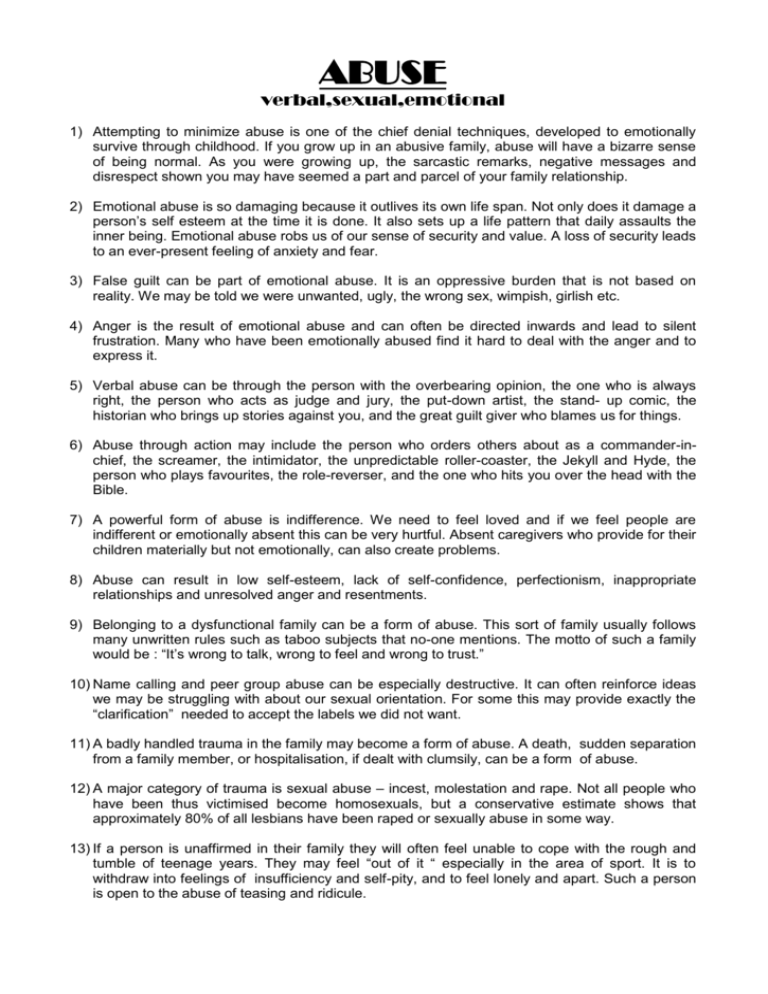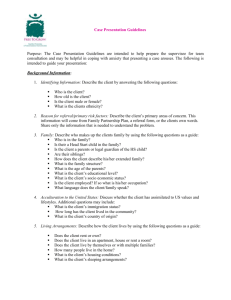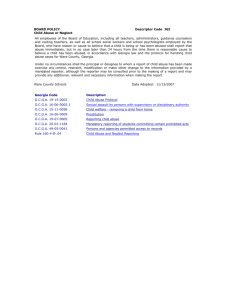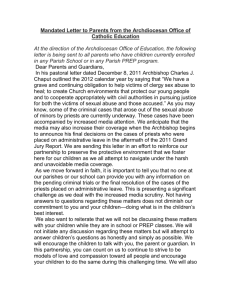
ABUSE
verbal,sexual,emotional
1) Attempting to minimize abuse is one of the chief denial techniques, developed to emotionally
survive through childhood. If you grow up in an abusive family, abuse will have a bizarre sense
of being normal. As you were growing up, the sarcastic remarks, negative messages and
disrespect shown you may have seemed a part and parcel of your family relationship.
2) Emotional abuse is so damaging because it outlives its own life span. Not only does it damage a
person’s self esteem at the time it is done. It also sets up a life pattern that daily assaults the
inner being. Emotional abuse robs us of our sense of security and value. A loss of security leads
to an ever-present feeling of anxiety and fear.
3) False guilt can be part of emotional abuse. It is an oppressive burden that is not based on
reality. We may be told we were unwanted, ugly, the wrong sex, wimpish, girlish etc.
4) Anger is the result of emotional abuse and can often be directed inwards and lead to silent
frustration. Many who have been emotionally abused find it hard to deal with the anger and to
express it.
5) Verbal abuse can be through the person with the overbearing opinion, the one who is always
right, the person who acts as judge and jury, the put-down artist, the stand- up comic, the
historian who brings up stories against you, and the great guilt giver who blames us for things.
6) Abuse through action may include the person who orders others about as a commander-inchief, the screamer, the intimidator, the unpredictable roller-coaster, the Jekyll and Hyde, the
person who plays favourites, the role-reverser, and the one who hits you over the head with the
Bible.
7) A powerful form of abuse is indifference. We need to feel loved and if we feel people are
indifferent or emotionally absent this can be very hurtful. Absent caregivers who provide for their
children materially but not emotionally, can also create problems.
8) Abuse can result in low self-esteem, lack of self-confidence, perfectionism, inappropriate
relationships and unresolved anger and resentments.
9) Belonging to a dysfunctional family can be a form of abuse. This sort of family usually follows
many unwritten rules such as taboo subjects that no-one mentions. The motto of such a family
would be : “It’s wrong to talk, wrong to feel and wrong to trust.”
10) Name calling and peer group abuse can be especially destructive. It can often reinforce ideas
we may be struggling with about our sexual orientation. For some this may provide exactly the
“clarification” needed to accept the labels we did not want.
11) A badly handled trauma in the family may become a form of abuse. A death, sudden separation
from a family member, or hospitalisation, if dealt with clumsily, can be a form of abuse.
12) A major category of trauma is sexual abuse – incest, molestation and rape. Not all people who
have been thus victimised become homosexuals, but a conservative estimate shows that
approximately 80% of all lesbians have been raped or sexually abuse in some way.
13) If a person is unaffirmed in their family they will often feel unable to cope with the rough and
tumble of teenage years. They may feel “out of it “ especially in the area of sport. It is to
withdraw into feelings of insufficiency and self-pity, and to feel lonely and apart. Such a person
is open to the abuse of teasing and ridicule.
14) Statistically, homosexuality is more closely tied to “social adaptation” factors, or “peer” factors,
than to factors concerning parents and family situations. If we do not feel part of our teenage
community, we can feel abused by it.
15) Sexual abuse blurs the distinction between intimacy and sex. A young boy naturally longs to be
emotionally close to men; when he is molested by one, he becomes confused. Is he wanting
affection or sex? Are his feelings natural or perverse?
16) Some abused males have such an exaggerated fear of becoming homosexual that, as teens or
young adults, they commit same-sex acts just to prove they don’t like it. But sexual stimulation
in the arms of another man, can generate new same-sex attractions, and theses males get
drawn further into homosexuality.
17) Same-sex abuse causes confusion about the victim’s sexual identity. They may feel less than
human, damaged, vulnerable, weak and defenceless. The male may feel detached from his own
masculinity – the exact dynamic that leads to a search for his male identity through sexual
experiences with other boys or men.
18) When women are sexually abused, the trauma often leads to anger, rage and hatred directed at
all men. These victims may develop a phobia of male-female sex, which makes them vulnerable
to the sexual advances of other women.
19) Sexual abuse can be verbal. Someone telling dirty jokes when you are alone with them, or may
be too young to receive what they are saying, can be difficult to cope with. Sexual remarks and
innuendo can also have an effect. Inappropriate staring can also be abusive.
20) There is a need to resolve self-blame about sexual abuse. There may be a tendency to think we
have caused the abuse, or that we didn’t stop it or that we enjoyed it, or that we didn’t tell
someone, or that we are not validated by God, since He did not protect us from the abuse.
21) If you were abused as a child it is essential that you come to terms with the old “messages” in
your head. Recognize the lies and reinforce the truth. The Bible is a special source of
information on what God says about us, about His feelings for us, about his desires, hopes and
dreams for each of us, His children. As we read and meditate on the words, we need to pray
that God will help us apply and personalize the truths.
22) Moving out of overly intimate relationships within the family is a process which takes time and
emotional maturity. We need to assess the effects of the abuse and take small steps to
disengage from the emotional entanglements. We need to ask God for insights into the hurts of
the other person and pray for them.
23) Forgiveness is not a one-time act; it is a process that can take a long time. We need to be open
to God’s leading and not try to force the issue. If we are not ready to forgive, God will help us to
get there. Forgiveness may need to occur on several levels as deeper levels of hurt come to the
surface.
24) To recover from abuse we need to renounce inner vows – “I’ll never trust a man / woman”;
“I’ll never be intimate with a man / woman”; “I’ll never give my heart away”; “I don’t need men /
women” It may be helpful to confess these to a trusted friend or counsellor.
25) “ I am with you ; that is all you need. My power shows up best in weak people.” Now I am glad
to boast about how weak I am ; I am glad to be a living demonstration of Christ’s power, instead
of showing off my own power or abilities. Since I know it is all for Christ’s good, I am quite happy
about “the thorn”, and about insults and hardships, persecutions and difficulties; for when I am
weak , then I am strong – the less I have , the more I depend on Him. (2 Corinthians 12; 9 & 10)
26) Past events, even those as destructive as abuse, do not have to control us for ever. Jesus died
to set us free from our past. By His grace, we can become strong in the areas where we have
been weak
27) Although the process of healing from abuse may take much time and effort, it is possible to find
inner release and freedom. The haunting memories of abuse may still remain, but they can feel
as if they happened to someone else.
28) When you forgive someone, you are not in any way saying that what they have done wrong to
you is unimportant. In fact, if it was unimportant there would be no need for forgiveness – you
would just carry on and ignore the situation. Real forgiveness can only take place when you
have some understanding of the sin and the damage involved.
29) There is a need to separate from the sin and the abuser. There has to be some kind of setting
aside of the experience, but this should not be confused with forgetting it. It is possible to move
away from the pain and leave the sin where it belongs – with the abuser.
30) The church may be tempted to want a quick response about forgiveness. But there is no help to
be found in just saying the words, and unless it is at the end of a long process of help and
support, the abused cannot even understand the meaning of forgiveness, because they have
not appreciated the extent of the damage. There is no point tin pretending that you have
forgiven someone just to make other people feel better.
31) Forgiveness will not wipe out the scars. There will still be damage. Complete forgiveness may
never be reached, it is more a direction that you are aiming towards.
32) Many feel that abuse has to be kept secret , even from God. This can make God remote and
distant. References in church to God or the Holy Spirit wanting to “take control “ of our lives can
be incredibly difficult. Descriptions of the Holy Spirit “breaking and melting and moulding” can
make us freeze inside. Many find it easier to relate to Jesus , rather than God or the Holy Spirit
because He does not control. Jesus suffered the ultimate abuse by His death on the cross, and
may be easier to relate to.
33) How we feel will often depend on how we view things. If we look at the things in our life that still
need to change anf the difficult struggles we sometimes experience, we could despair. But if we
look back and consider how far we have come, we can feel encouraged.
34) Screaming louder and more angrily at God will not heal the effects of abuse. We need to learn
to glorify God within the limits of our ability. We cannot force ourselves to be someone else, we
cannot be “victorious” Christians, but God loves us just as we are.
35) Abusers get a bad press and yet they need as much help, or more than their victims. People
who resist a strong temptation to abuse can also be paralysed with fear at the thought of what
could have happened in their lives. It is very difficult to share with others that God has given us
this restraint and gift of common-sense. We may struggle with keeping secret a deep fear inside
that we may still fall into temptation, and a desire to give God the glory for helping us to cope.
36) People who have abused others cannot put the clock back, and have to learn to live with what
they have done. Christianity offers forgiveness and a new start. There is also a need to abandon
hope of putting things right for the victim. It is best to pray about the past, learn from it and live
life as “God’s new creation.”
___________________________________________________________________________
“Healing the Scars of Emotional Abuse” by Gregory L Jantz
“ Coming out of Homosexuality” by Bob Davis & Lori Retzel
“ Releasing the Scream “ by Rebecca Newman







